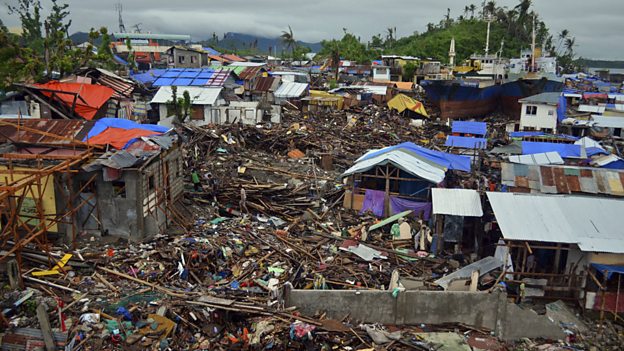Unit 30: Tales of survival
Present and past modals of ability
Select a unit
- 1 Nice to meet you!
- 2 What to wear
- 3 Like this, like that
- 4 The daily grind
- 5 Christmas every day
- 6 Great achievers
- 7 The Titanic
- 8 Travel
- 9 The big wedding
- 10 Sunny's job hunt
- 11 The bucket list
- 12 Moving and migration
- 13 Welcome to BBC Broadcasting House
- 14 New Year, New Project
- 15 From Handel to Hendrix
- 16 What's the weather like?
- 17 The Digital Revolution
- 18 A detective story
- 19 A place to live
- 20 The Cult of Celebrity
- 21 Welcome to your new job
- 22 Beyond the planets
- 23 Great expectations!
- 24 Eco-tourism
- 25 Moving house
- 26 It must be love
- 27 Job hunting success... and failure
- 28 Speeding into the future
- 29 Lost arts
- 30 Tales of survival
Session 1
Time to learn this unit's vocabulary
Typhoons, cyclones, earthquakes... sadly, they happen all too often. This unit is about disasters and how people survive them. In this session, we help you learn the language you need to talk about these events.
Activity 1
When disaster strikes...
After Typhoon Haiyan
In this unit we're going to be looking at natural disasters, and how people survive them. First, to help you learn the vocabulary for the unit, we're going to read about a tragedy that happened in the Philippines in 2013.
To do
Read the text and answer the questions.
Read the text and complete the activity

Typhoon Haiyan was one of the most destructive storms in history.
The statistics speak for themselves. It killed over 6,000 people, six million workers lost their sources of income and 30,000 boats were destroyed. In total, around 15 million people were affected. In many towns and cities over 90% of buildings were ruined, forcing many to live in shelters.
The storm struck on 8 November 2013. It was the most powerful ever to hit land, with heavy rain, winds of over 170 mph and sea levels rising by up to seven metres. At present the Philippines sees around 20 typhoons a year. The IPCC believes that climate change will mean an increase in cyclones, leaving even more people in the region at risk.
The scale of the tragedy also triggered a huge humanitarian response. Charities and aid agencies around the world raised money and delivered aid to populations affected, and volunteers from around the world offered their skills and assistance. Many people were critical of the pace of the Filipino government's efforts to rebuild communities, though officials said they responded well to their country's biggest ever logistical challenge.
True or false?
6 Questions
Are these statements true or false?
Help
Activity
Are these statements true or false?
Hint
Have a look at the last paragraph againHelp
Activity
Are these statements true or false?
Hint
Have a look at paragraph threeHelp
Activity
Are these statements true or false?
Hint
Have another look at paragraph twoHelp
Activity
Are these statements true or false?
Hint
What does 'volunteers' mean?Help
Activity
Are these statements true or false?
Hint
Double check the speedHelp
Activity
Are these statements true or false?
Hint
Is the word 'humanist'? Or something else...Question 1 of 6
True
False
Excellent! Great job! Bad luck! You scored:
True or false?
6 Questions
Are these statements true or false?
Help
Activity
Are these statements true or false?
Hint
Have a look at the last paragraph againQuestion 1 of 6
Help
Activity
Are these statements true or false?
Hint
Have a look at paragraph threeQuestion 2 of 6
Help
Activity
Are these statements true or false?
Hint
Have another look at paragraph twoQuestion 3 of 6
Help
Activity
Are these statements true or false?
Hint
What does 'volunteers' mean?Question 4 of 6
Help
Activity
Are these statements true or false?
Hint
Double check the speedQuestion 5 of 6
Help
Activity
Are these statements true or false?
Hint
Is the word 'humanist'? Or something else...Question 6 of 6
Excellent! Great job! Bad luck! You scored:
Next
Well done. Now it's time to look at all the new language in a vocabulary test.
Session Vocabulary
typhoon
a very strong wind which moves in a circle in the Western Pacific Oceandisasters
events that cause a lot of harmtragedy
a very sad eventdestructive
causing a lot of damageshelters
places which give protectionstruck
hitmph
miles per hour (speed)cyclones
very strong winds which move in circlesat risk
in danger (of)triggered
causedhumanitarian
relating to improving human lives and reducing sufferingcharities
organisations people give money to so they can help othersaid agencies
organisations that provide money and help to those sufferingpopulations
(here) groups of people in a particular situationvolunteers
people who give their time for freelogistical
relating to the careful organisation of things and people to achieve a difficult task